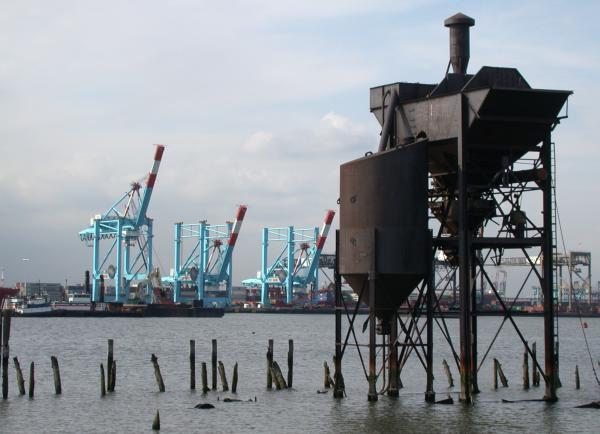This is Cabotage
The word “cabotage” looks and sounds like a word meaning “the act of destroying or damaging something deliberately so that it does not work correctly,” but is entirely unrelated. Cabotage is a noun, meaning “trade or transport in coastal waters or airspace or between two points within a country.” If you’re in the United States and are shipping items from Portland to San Francisco, for example, you’re engaged in cabotage. The fact that the word exists reflects upon its importance, at least relative to other forms of trade or transport. Nearly a century ago, the United States government enacted the Merchant Marine Act of 1920 (better known as the Jones Act) which was specifically written to regulate cabotage — that is, naval trade between two domestic ports — in order to make sure that the nation had a vibrant marine industry.
But today, the Jones Act is a strange thorn in the side of New Jersey’s Department of Transportation (DOT).
The winter of 2014 has taken its toll on Northeastern Americans, with snow seemingly in the forecast every week and low temperatures — it rarely crests above freezing for more than a day at a time — leading to a constant battle against ice and otherwise slick conditions. For those who take care of the public roadways, there are a few go-to materials in this battle against the elements. Dirt is strewn on roads to provide extra traction for cars, buses, and the like; and rock salt is also added, as it lowers the temperature needed for the snow and ice to melt. Unfortunately, the well above-typical amount of snow in the region has led to salt shortages, requiring many states and municipalities to bring more in.
New Jersey, in this case, contracted with a company named International Salt to provide rock salt to the Department of Transportation. International Salt stores much of the salt in Port Newark, just a few miles outside of New York City, and a major marine gateway to the rest of New Jersey. But the supplies at Port Newark have run low, so International Salt needed to ship in reserves from their supply center in Maine — 40,000 tons of rock salt waiting for transport. The good news: there was an otherwise empty cargo ship, the Anastasia S., which happened to be in the same port in Maine as the Jersey-bound rock salt.
The bad news: The Anastasia S.’s home port is the Marshall Islands.
The Jones Act, as Wikipedia summarizes, “deals with cabotage (i.e., coastal shipping) and requires that all goods transported by water between U.S. ports be carried on U.S.-flag ships, constructed in the United States, owned by U.S. citizens, and crewed by U.S. citizens and U.S. permanent residents.” The Maine and New Jersey ports are both U.S. ones, putting the Jones Act in play. The Anastasia S. isn’t an American ship, barring it from use in this situation — even though it is sitting in Maine, empty, and entirely capable of transporting all the salt down to where it’s needed.
Instead, the New Jersey DOT had to contract with smaller barges which could only carry roughly a quarter of the salt each. This not only cost a lot more money — $1.2 million instead of about $500,000 — but also delayed the shipment well past the point it was needed. As the New York Times reported, one of the ships was stranded in Providence, Rhode Island due to inclement weather for a few days. By the time it arrived, temperatures in New Jersey had risen above the salt-free melting point, rendering much of the new supply redundant.
Eventually, New Jersey should be receiving all of its salt (even though it didn’t notice right away), but the Jones Act’s applicability has risen eyebrows, given the near-emergency situation. Had the federal government wanted to issue a one-time, limited exception to the Jones Act, there’s precedent for it, but New Jersey’s senators declined to request one, instead blaming the state DOT for poor planning and a failure to communicate the immediate salt needs until very late in the process.
Bonus Fact: There are lots of types of salt, and you may find “kosher salt” at your local grocer. The name is a misnomer, though. While the salt is (almost certainly) kosher, it isn’t named “kosher salt” for that reason. It’s called “kosher salt” because that type of salt is used to soak up excess surface blood from meats. It should be called “koshering salt” or “kashering salt.”
From the Archives: Wash Out: Probably the worst thing that could ever happen to a salt mine.
Related: A “cabotage” sticker for your car. (I don’t really get it either.)

